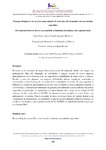Mostrar o rexistro simple do ítem
El juego dirigido en los recreos como método de inclusión del alumnado con necesidades especiales
| dc.contributor.author | García Arias, Toni | |
| dc.contributor.author | Nogales Martínez, Cristina | |
| dc.date.accessioned | 2019-05-09T08:43:17Z | |
| dc.date.available | 2019-05-09T08:43:17Z | |
| dc.date.issued | 2018 | |
| dc.identifier.citation | Sportis, 2018, 4 (2):388-408 ISSN: 2386-8333 | es_ES |
| dc.identifier.issn | 2386-8333 | |
| dc.identifier.uri | http://hdl.handle.net/2183/22839 | |
| dc.description.abstract | [Resumen] El recreo es el momento de mayor interacción social del alumnado dentro del colegio. La participación libre del alumnado en actividades y juegos durante el recreo depende principalmente de los intereses y de las capacidades y habilidades de cada alumno. Debido a este carácter socializador de primer orden, el recreo supone un momento relevante en lo referente a dos aspectos educativos fundamentales: la convivencia escolar y la inclusión-exclusión de los alumnos. Aunque existen diversos estudios que demuestran que se produce una mejora de la convivencia escolar en los recreos dirigidos con respecto a los recreos libres, no existen estudios que evidencien si existe una mejora de la inclusión del alumnado con necesidades especiales en los recreos con actividades dirigidas. En esta experiencia didáctica se pretende analizar en qué medida los recreos con actividades y juegos dirigidos mejoran la convivencia y la inclusión. | es_ES |
| dc.description.abstract | [Abstract] Recess is one of the moments where greater social interaction take places in schools. The free participation of students in activities and games during recess depends –mainly-on the interests and abilities of each student. Because of this, students with greater physical, cognitive sensory and emotional difficulties take risk of exclusion in recess activities.The aim of this didactic experience is to analyse the extent to which recces with directed activities or games can improve coexistence and inclusion of the students in general and, particularly, in children with special educational needs. The experience took place in a school with 308 students, among them, 39 were children with special educational needs. This experience was carried out for five months, combining directed and free activities, with voluntary participation. For the collection of data, daily record sheets and a preference questionnaire were used. The conclusion was that the directed activities reduced the number of conflicts in the playground and that the participation of children with special educational needs was significantly greater than in the free activities. | es_ES |
| dc.language.iso | spa | es_ES |
| dc.publisher | Universidade da Coruña | es_ES |
| dc.relation.uri | https://doi.org/10.17979/sportis.2018.4.2.3413 | |
| dc.rights | Atribución-NoComercial-SinDerivadas 3.0 España | es_ES |
| dc.rights.uri | http://creativecommons.org/licenses/by-nc-nd/3.0/es/ | * |
| dc.subject | Recreo dirigido | es_ES |
| dc.subject | Recreo libre | es_ES |
| dc.subject | Convivencia | es_ES |
| dc.subject | Conductas | es_ES |
| dc.subject | Necesidades especiales | es_ES |
| dc.subject | Directed playground | es_ES |
| dc.subject | Free playground | es_ES |
| dc.subject | School coexistence | es_ES |
| dc.subject | Behaviors | es_ES |
| dc.subject | Special needs | es_ES |
| dc.title | El juego dirigido en los recreos como método de inclusión del alumnado con necesidades especiales | es_ES |
| dc.title.alternative | Directed activities in Recess as a method of inclusion of students with special needs | es_ES |
| dc.type | info:eu-repo/semantics/article | es_ES |
| dc.rights.access | info:eu-repo/semantics/openAccess | es_ES |
| UDC.journalTitle | Sportis | es_ES |
| UDC.volume | 4 | es_ES |
| UDC.issue | 2 | es_ES |
| UDC.startPage | 388 | es_ES |
| UDC.endPage | 408 | es_ES |






